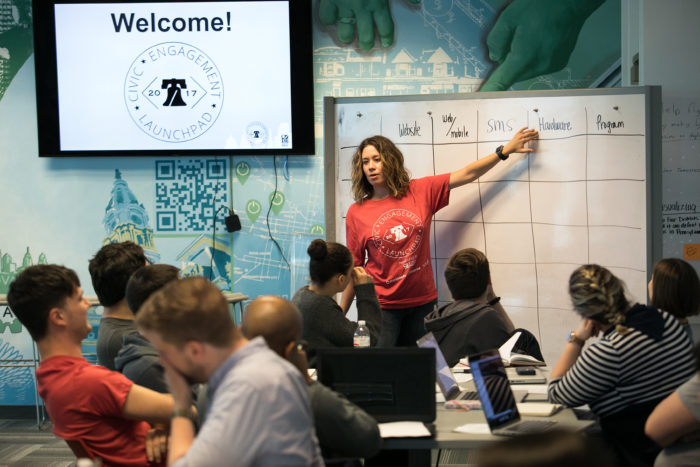Philadelphia’s Office of Innovation and Technology (OIT) is trying hard to dispel the long-thought concept that working in local government means you’re slow to change or innovate.
The Office’s goal was always to show how other departments can implement technology or new approaches to get things done. But when the pandemic hit in early 2020, the Office was tasked with getting folks to adapt to new technology, and fast. Since then, OIT has helped City employees work remotely, and this summer, Chief Information Officer Mark Wheeler told Technical.ly they’ve gotten more comfortable than ever before.
“It shattered our own disbelief in our own ability to move quickly and adopt and change quickly,” he said.
Similar lessons were learned during this year’s cohort of the City’s Innovation Academy — a program that trains City employees from different departments in creative thinking and problem-solving.
On Twitter, Director of Innovation Eliza Pollack shared sentiments from the program’s eighth cohort, which brought together 19 middle and senior managers from the departments of Commerce, Parks and Recreation, Revenue, Fire, Airport, the Board of Ethics and OIT. Members from the Office of Education, Philadelphia Housing Development Corporation, Office of Property Assessment, Office of Public Health, Office of Economic Opportunity, Office of Sustainability and Department of Human Services also joined.
yesterday we wrapped up the *8th!* cohort of the @PHLInnovation innovation academy & i couldn't be prouder of the @PhiladelphiaGov employees who graduated – we heard some fantastic final presentations about problem solving & innovating in gov't & here are their big take-aways:
— Eliza Pollack (@elizaPHL) November 17, 2021
You can check out the entire thread here, but biggest lessons learned include identifying the right stakeholders for your project and tailoring your message to each distinct group. City governments, especially, often have different departments doing similar work, and can aim to be less siloed and share resources when possible. This sharing will lead to best practices.
Pollack tweeted that her biggest takeaway was: “At their core, city employees are in their roles because they want to make lives better for all Philadelphians. It’s truly the reason that people come work for government and the reason they stay, despite all the challenges.”
4. & related to that – problems that seem very specifically tied to one team or department are actually really universal once you dig down into root causes. if we could figure out how to tackle some of those deeper challenges, we might also solve more of our unique issues.
— Eliza Pollack (@elizaPHL) November 17, 2021
While the goal for this program has always been to help employees build innovation toolboxes, the programing has adapted over the years. This most recent cohort had a heavy emphasis on the process behind problem-solving, Pollack said.
The cohort met in-person, after some debate about COVID-19 safety precautions, but all participants were vaccinated and masked during meetings. They assigned employees into small groups to develop their ideas and innovation frameworks, then presented what they learned to the rest of the cohort. Pollack’s Twitter thread outlines these lessons.
“It was truly a reminder that there is just no substitution for in person collaboration — building relationships and working together through the type of curriculum we have is just so much more impactful when it’s IRL,” Pollack said.
this theme came up again & again, & is such a powerful reminder for both residents & colleagues that we have great power, great responsibility, great motivation & great capacity to do so much good if we keep pursuing opportunities that allow us to challenge the status quo.
— Eliza Pollack (@elizaPHL) November 17, 2021
Before you go...
Please consider supporting Technical.ly to keep our independent journalism strong. Unlike most business-focused media outlets, we don’t have a paywall. Instead, we count on your personal and organizational support.
Join our growing Slack community
Join 5,000 tech professionals and entrepreneurs in our community Slack today!

The person charged in the UnitedHealthcare CEO shooting had a ton of tech connections

From rejection to innovation: How I built a tool to beat AI hiring algorithms at their own game

Where are the country’s most vibrant tech and startup communities?


